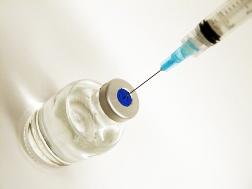|

"Parents who choose not to vaccinate their children,
put them at risk of complications" |
A four-year-old boy was brought into the Emergency Room at Hillel Yaffe Medical Center several days ago to be tested for measles, after being referred by the pediatrician in the community under the Regional Health Office's guidelines. The tests performed confirmed the suspicion of measles.
The child developed symptoms of fever, eye infection and a rash, but did not need to be hospitalized. He was sent home for recovery. Notification was sent to the the Regional Health Office for completion of the treatment required for anybody who had been in contact with the child. As previously stated, the child's parents confirmed that he, in fact, had not been vaccinated against the disease. The child recently returned from a visit to a country where the rate of vaccination against the disease is low, and it is assumed that he was infected while there.
Dr. Michal Shtein, Director of the Infectious Diseases Unit, and Dr. Adi Klein, Director of the Department of Pediatrics, call on parents to vaccinate against measles as required, as well as against other diseases for which Israel's Ministry of Health provides vital vaccinations.
Dr. Adi Klein said, "From time to time, we encounter parents who claim that the vaccinations are for diseases 'that no longer exist' and that they are afraid of side effects, and that's why they don't want to vaccinate their children. This is a fundamental mistake in understanding the importance of the immunizations for the health of their children and the surrounding environment. I want to emphasize - the diseases for which we have vaccinations are diseases that have been eradicated thanks to immunization. That is why vaccinations were and continue to be critical for children's health and for public health as well. Moreover, the added value of vaccinating children is far greater than the potential side effects. The measles virus is extremely contagious and can lead to serious complications. Before arriving at the hospital, the child came into contact with many people and the spread of the virus emphasizes the need to vaccinate the general public,
Dr. Shtein added, "Measles is a highly contagious disease that is spread by tiny airborne particles that travel long distances. Anyone who was not previously infected or vaccinated will be infected with almost 100% certainty. Manifestation of the disease include fever, eye infection and a rash, seemingly mild symptoms. However, when there are complications, it can develop into pneumonia, meningitis and even death, so vaccination is extremely important. There are also long-term complications of progressive brain inflammation (encephalitis) that destroys the brain. We don't have treatment for measles and the associated complications, and the only way to prevent them is through vaccination. Parents who opt not to vaccinate their children are putting them at risk for complications and are endangering the lives of other children and adults around them who cannot be vaccinated due to their young age, pregnancy or immunodeficiency, or those who were vaccinated, but did not develop an immune response."
Both of them state that what's important is that parents make sure their children get all of the vaccinations included in the health basket according to the Ministry of Health Guidelines. Measles is a disease that poses a major threat to health, and it can be prevented through a simple vaccination that is provided for free at family health clinics at the HMOs.
How to recognize measles
The first signs of the disease are fever and runny nose. The rash develops later, first on the head and then spreads to the rest of the body. It is important to pay attention to these symptoms, especially in a child who has not been vaccinated. If you suspect your child may have the disease, avoid contact with other people to the extent possible and consult with a physician right away. The measles vaccination is one of the standard vaccinations in Israel, and its side effects, if any appear, are minor. They may appear about one week after vaccination and include fever and a rash. They are mild and resolve on their own.











.jpg?BannerID=39)

